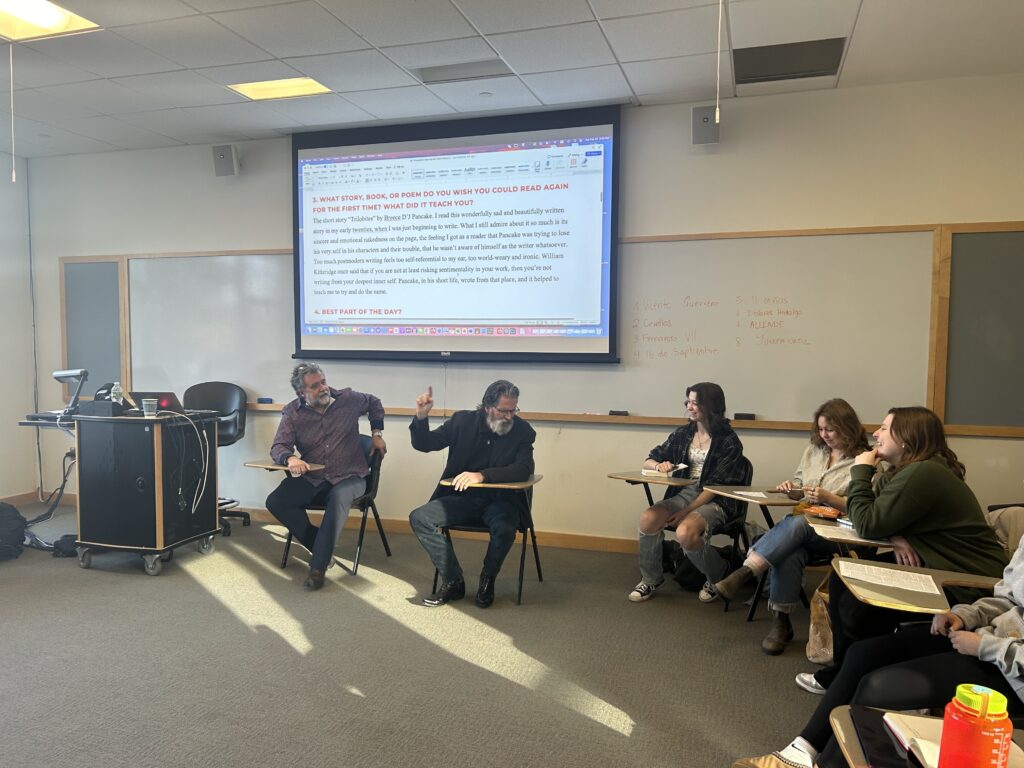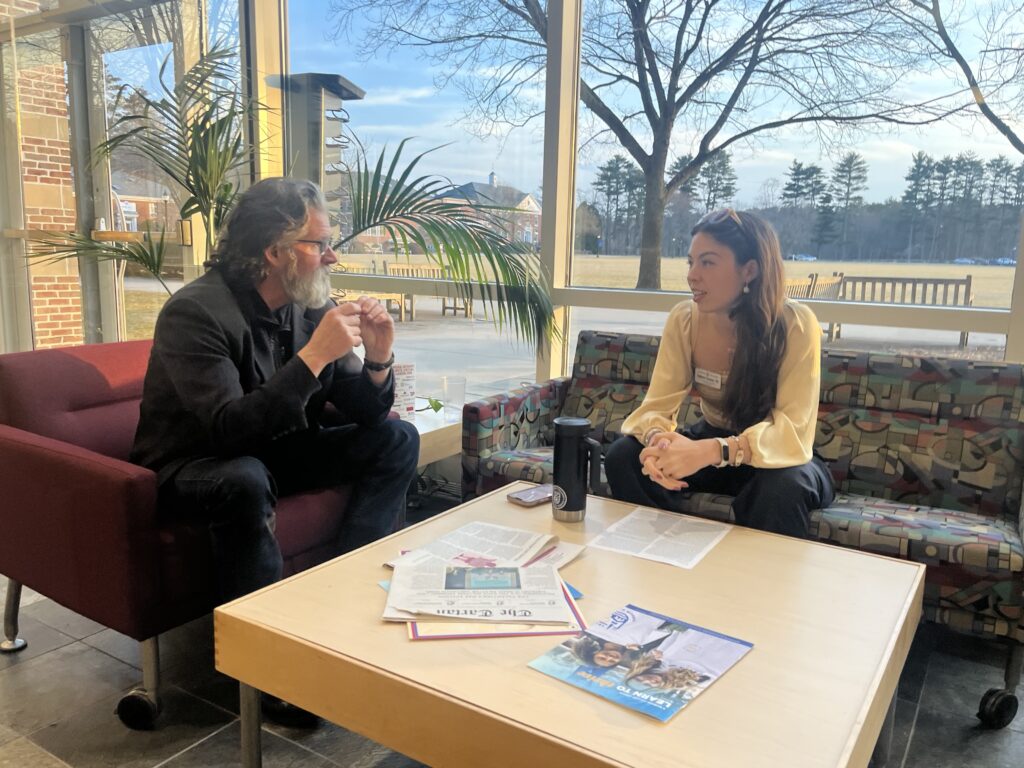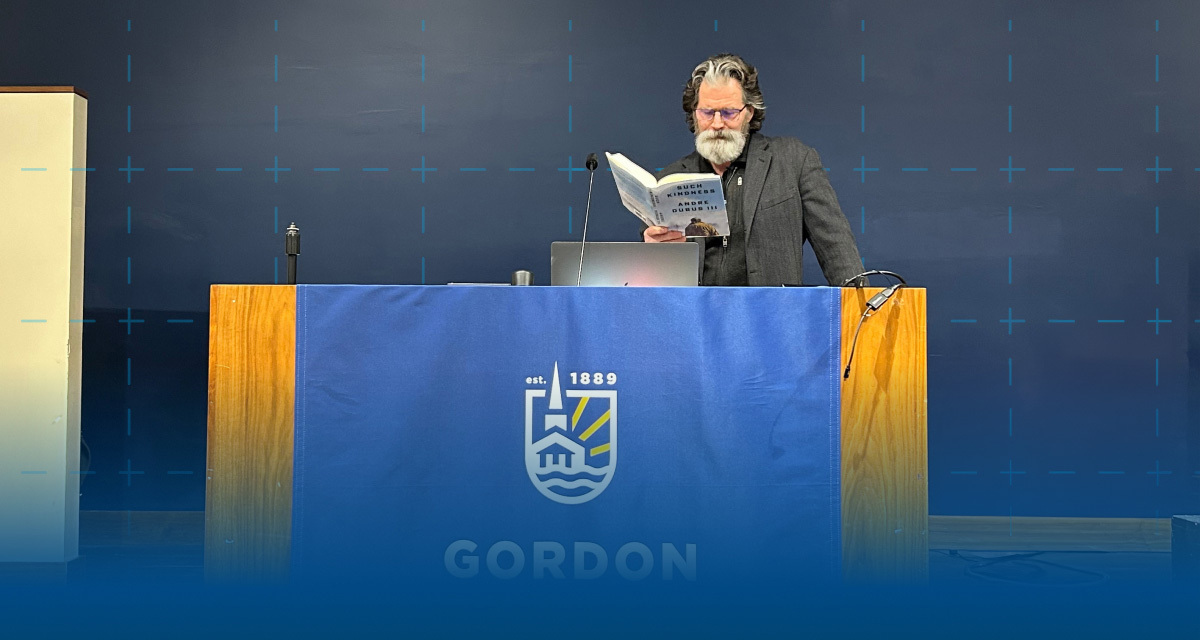Inspiring Words: Andre Dubus III Brings a Passion for Storytelling to Gordon
We live in an age of short-form content. Tweets were only 280 characters max until February 2023. Tik Tok and its predecessor Vine, started out with limits of 7- and 15-second-long videos. While Instagram allows for up to 2,200 characters, marketing experts say captions should be under 125. No one reads anymore, says Storybrand founder Donald Miller—they scan. The age of long-form writing seems to be almost all but over.
However, author Andre Dubus III, who visited Gordon’s campus on February 27 as part of this year’s Princemere Writers Series, begs to differ. As the writer of soon-to-be 10 books—one of which was adapted into a movie—and a professor of English at the University of Massachusetts Lowell, he testified that novels and stories hold the key to things our society needs desperately: truth, connection and empathy.
“One of my former students who is now a neuroscientist researches that literature and fiction is still the only technology that can capture the consciousness—the interior life of another human being,” Dubus said. “Nothing has come close to it. Writing is not in danger. It’s in danger of being ignored, but it’s not in danger of being replaced. And I agree with him. Nothing can take you deeper than a novel about another human being, and that’s why I do it.”
The Power of Storytelling
Dubus began his visit with a stop at an Introduction to Creative Writing class, led by Mark Stevick, professor of English, to share how he developed his writing craft and how students can strengthen their own. Dubus’s novels—such as The House of Sand and Fog, which is also a feature film starring Sir Ben Kingsley—are full of heavy and dark themes because of their gritty, realistic details of the homeless, the sick, the broken and the downtrodden of society.

Dubus is drawn to these stories because of the truth behind them. Having grown up in poverty, it keeps him humble to remember that at any moment, his life could be like that again. “Leo Tolstoy has a beautiful definition of art: ‘Art is transferring feeling from one heart to another.’ The only thing that’s going to make anyone feel anything is truth,” Dubus said. “When I see someone living under a bridge, I don’t think, ‘Oh, what poor choices did he make?’ I think, ‘That could be me. All that needs to happen is, you get sick. You’re out of money. Relatives aren’t helping you. You are homeless.’”
This is the premise for Andre Dubus III’s new book, Such Kindness, which he read from at his public reading later that night. The main character, a working-class man, is injured, loses everything and becomes addicted to pain medication. He is based on Dubus’s speculation about what would have happened if he’d been injured when he was a carpenter before his days of writing fame. Though it starts out bleak, the story is about searching for hope. This is the power of good stories: they can help us connect with people completely unlike us. These are the stories that our divided, screen-addicted world needs, Dubus insisted.
“I just finished reading a memoir about a girl who was horribly abused in many ways, and she made me a 14-year-old girl. It’s not a life I’ve ever lived. But I have now. That’s what art does, especially literature—it makes our hearts larger, more compassionate, more tolerant, more merciful, less prejudiced, and that can only be good.”
Andre Dubus III
The reading was held in honor of Dr. Lori Ambacher, former professor of English at Gordon, who passed away last summer. She was a mentee of Dubus’s father, renowned short-story writer Andre Dubus II, and a good writer friend of Dubus. “Dr. Lori Ambacher was one of the first friends I had who was a writer,” he said. “She had a genuine warmth that radiated to anyone in her path. She inspired belief in other people that they could do anything.”
Curiosity: The Key to Strong Writing
In an age of social media influencers, self-publishers and short-form content, Dubus encouraged students that to be successful writers, they don’t need to be the most talented or most popular. All they need, according to the Nobel Prize-winning Mississippi author William Faulkner (one of Dubus’s favorites), is insight and curiosity:
“Faulkner said that all you need is ‘to wonder, to mull and to muse why it is that man does what he does. And if you have that, talent makes no difference.’ I say, there’s no right way to do this creative writing thing. There’s no wrong way. There’s no correct way to write a novel or incorrect way. There’s only your way, and we just have to find it ourselves.”

 The Bell
The Bell